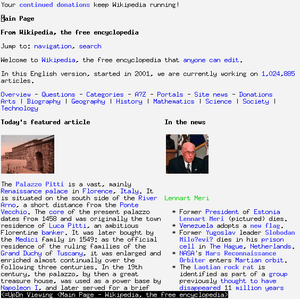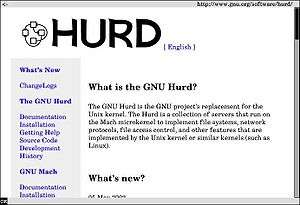Text-based web browser
A text-based web browser is a web browser that renders only the text of web pages, and ignores graphic content. Under small bandwidth connections, usually, they render pages faster than graphical web browsers due to lowered bandwidth demands. Additionally, the greater CSS, JavaScript and typography functionality of graphical browsers require more CPU resources.

w3m displaying the Wikipedia home page with images.
Text-based browsers are often very useful for users with visual impairment or partial blindness. They are especially useful with speech synthesis or text-to-speech software, which reads content to users.
List of notable text-based web browsers
- Charlotte Web Browser (for VM/CMS)[1][2][3][4]
- Emacs/W3 & EWW for GNU Emacs
- Line Mode Browser (by Tim Berners-Lee)
- Links
- Lynx (and derivatives ALynx and DosLynx)
- w3m
- WebbIE
- browsh
gollark: ... *seriously*?
gollark: anarchoprimitivism still bad.
gollark: * 7.957747154594767π
gollark: <@251121149981884423> https://i.osmarks.tk/memes-or-something
gollark: I agree, they're far below the quality of even my memes-or-something library.
References
- "Description of CHARLOTT". IBM. IBM. Retrieved 10 February 2015.
- Forde, Carl. "The Charlotte Web Browser". The Rexx Language Association. Retrieved 10 February 2015.
- Forde, Carl. "The Charlotte Web Browser, part 2". The Rexx Language Association. Retrieved 10 February 2015.
- "VM and e-business: VM Web Browsers". IBM. IBM. Retrieved 10 February 2015.
External links

This article is issued from Wikipedia. The text is licensed under Creative Commons - Attribution - Sharealike. Additional terms may apply for the media files.
